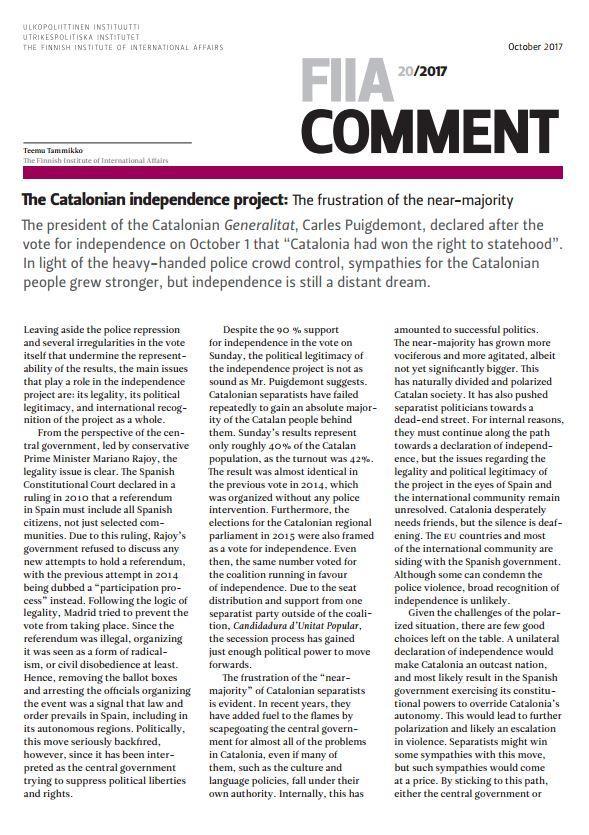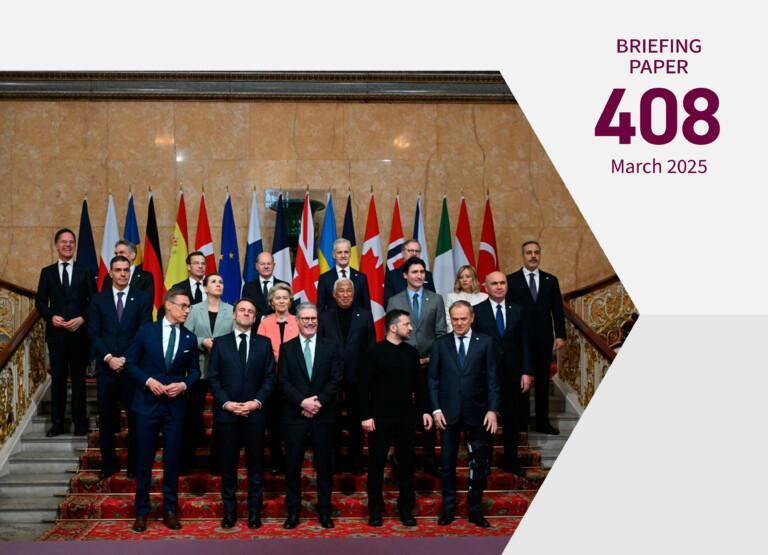
Despite heavy domestic and international campaigning, the separatists have not managed to increase their support, but polarization and instability in Catalonia. Catalonian separatists are at a crossroads: whether to continue flogging the dead horse of the unilateral independence process, or to calm down in order to regain control over autonomous powers. Spain must answer politically to the underlying issues of constitutional crisis and post-economic crisis discontent. Mere “lawfare” against separatism is not enough to justify the current system.
The EU has no other option but to observe events from the outside, while the Spanish government refrains from requesting an intervention in the meantime. This may diminish pro-EU sentiments amongst all of the separatist regions in Europe, and force them to search other allies. The international community is highly reluctant to recognize new states, especially cases like Catalonia, where people can already enjoy full civil and human rights, the rule of law, and affluence.
Introduction
Autumn 2017 was extremely hectic in Catalonia. An illegal referendum in October set in motion a chain of events that included police violence, street riots, and a unilateral declaration of independence. In response, the central government of Spain suspended the autonomous powers of Catalonia, overthrew the parliament, and called for new elections. The leading political figures of the ousted government were charged with rebellion, sedition and embezzlement. Three of them were detained and imprisoned, five escaped justice by going into exile.
After such a turbulent few months, the independence process is now facing a monumental hangover. Catalonian parliamentary elections in December did not resolve the political situation. The clear winner of the elections was the constitutionalist Ciutadans (Cs) party, but since the stance towards independence is currently the only relevant dividing factor, it cannot muster enough support in parliament in order to form a government. Hence, the two main sections of the separatist front, Junts per Catalunya (JxCAT) and Esquerra Republicana de Catalunya (ERC), are likely to continue in power. However, the separatist front is far from united.
The main question amongst the separatists is whether the ousted prime minister, Carles Puigdemont (JxCAT), can be nominated as a candidate for the premiership. Since he is in exile, there is a mountain of bureaucratic, procedural and legal hindrances against him taking the lead in the investidura government formation process. According juridical interpretations investidura has to be implemented in person, not from a distance. However, Puigdemont will be arrested the moment he sets foot on Spanish soil due to the severity of the charges against him. Separatists claim that the criminal charges against him constitute political persecution, and due to the electoral results, they have the democratic legitimacy to appoint the prime minister as they please, and they are ready to bypass the regulations by any means possible.
The choice for the premiership is relevant regarding the future strategy of the separatist front. By opting for Puigdemont, separatists would continue on the same unilateral path that led to the autumn confrontation with the central government. This would be flogging a dead horse, which is why some separatists would prioritize regaining control over autonomy. This would mean sidetracking the independence process, at least for a while.
The suspension of autonomy is not in the interests of Spanish Prime Minister Mariano Rajoy (Partido Popular, PP) either, but he will not hesitate to use this option if the separatists are unwilling to respect the Spanish constitution and court rulings. The same applies to possible negotiations. Rajoy will not bend if the separatists continue on their chosen path. Since the declaration of independence did not receive any international recognition either, the international community, the EU included, will leave the issue entirely in Rajoy’s hands. If the separatists are not willing to change their strategy, the independence process will remain deadlocked for a long time.
This Briefing Paper starts with an analysis of the root causes of Catalonian separatism and the way in which they have contributed to the political process towards independence during the past few years. Why did it emerge so suddenly, and why just now? After analyzing the background of the current confrontation, it is possible to proceed to the main questions that this paper seeks to address: Is Catalonia currently a laboratory for European separatism? Could the Catalonian independence process cause a domino effect whereby different regions claim similar rights to their own state, or is the international response to it posing an invisible barrier for the separatist regions?
Root causes of polarization
Catalonia has always been a distinct region in Spain. Historically, it has been one of the wealthiest, most industrialized, most modern and liberal areas in the country. Catalonia has also enjoyed varying degrees of autonomy during its history. Hence, it is easy to understand that secessionism and separatism have always been relevant political streams in the region. However, one could witness a relatively sudden political change taking place in 2012. This was when secessionism turned into full-scale separatism, which again caused the current confrontation with the central government. There are arguably three main factors that led to this political turn:
- constitutional crisis and opting for “lawfare”,
- the economic crisis in 2008, which created a suitable breeding ground for a new, anti-centralist movement, and
- the political populism and blame-gaming that have increased polarization and instability
Constitutional crisis
One of the core ideas in the 1978 Spanish constitution was to address strong regional identities and vast differences amongst the regions by treating them in accordance with the principle of equity rather than equality. Therefore each of the 17 autonomous regions have different degrees of autonomy in different fields. Catalonia accounts for 19% of the Spanish GDP, being the biggest contributor to the treasury together with the Community of Madrid, but it is one of the regions that spends less per patient on healthcare, and less per student on education.
Differentiation between autonomies may have its benefits, such as guaranteeing that all of the regions can have more or less the same services and proper infrastructure despite their income, and that separatist urges are downplayed in the most critical regions, particularly in the Basque Country. However, during the years it has created some problems that would otherwise not exist, including overlapping bureaucracies, high public spending, and a sense of unfairness in those regions providing more for others.
In 2005, the Catalonian government prepared a new interpretation of and reform proposal for the legislation on its autonomy, estatut. The process enjoyed widespread support in Catalonia, since the main reform would have been fiscal autonomy. In 2006 the proposal for the new estatut was submitted to a referendum in Catalonia and won resounding approval. The national parliament duly approved the reforms. However, these reforms were never executed, since the conservative party PP, then in opposition, arbitrated the decision in the Constitutional Tribunal.
In 2010 the Constitutional Tribunal ruled that the 2006 referendum was not legal, since any referendum in Spain should include the whole Spanish populace, not just selected parts of it. This ruling is the main argument that Mariano Rajoy’s governments (from 2011 to the present day) have used in order to prevent any referendum from taking place in Catalonia. It was also the first step in his strategy to opt for so-called lawfare, meaning that he prefers to use the Spanish legal system instead of political argumentation against the independence process. Had this ruling turned out otherwise and had the reforms been in practice since 2006, everything could be calm and composed in Catalonia today. The bitterness and disappointment that the loss of fiscal autonomy caused for the Catalonian economic elites made them to turn more towards full separatism.
Another consequence of the court ruling was that respect for the Spanish Constitution in Catalonia diminished, and many started to believe that the judiciary is – if not politically dictated – at least biased against Catalonian interests. Since Mariano Rajoy’s government has fought the separatists, only through referring to law and court decisions, this impression has intensified. Without addressing the issue of separatism through active political campaigning, Rajoy is losing legitimacy. In sum, the process that started in 2005 as a reform of autonomous powers has become a constitutional crisis that threatens the existence of the whole Spanish state.
Economic crisis
Looking at the opinion polls, the support for a fully independent Catalonian state prior to 2012 was not as significant as support for more autonomous powers (Figure 1). Interestingly, neither the new estatut in 2006, nor the ruling from the Constitutional Tribunal annulling the estatut in 2010 seemed to impact public opinion. However, there was a sudden leap in the support for a fully independent Catalonia in 2012, when it quickly rose to 44% and peaked the following year at 49%.

Figure 1. Support for different types of political models in Catalonia. Source: Centro d’estudis d’Opin
The root cause underlying this sudden turn was the economic crisis in 2008 and its impact on Spanish – and Catalonian – politics. When the crisis hit Spain, Convergència I Unió (CiU), the predecessor of Carles Puigdemont’s Partit Demòcrata Europeu Català (PDECat), won the following elections in 2010. The leader of CiU, Artur Mas, became the prime minister of the Catalonian government. One of the government’s main tasks was to tackle the economic crisis and public deficit. This was done supporting the policies of the central government by making cuts in public spending, primarily to the healthcare system and education. These austerity measures faced strong public opposition, as they did throughout Spain. To this end, a new anti-austerity left-wing protest movement, Indignados, was born and city centres in Spain were turned into continuous theatres for different types of demonstrations against the political and economic elites. In Catalonia this added fuel to the already mentioned constitutional crisis.
Political populism and blame-gaming polarize the situation
Mas’ government became highly unpopular during his first term, and he was forced to call a new election as early as 2012. This is when the significant political turn took place. Mas realized that he needed something new to remain in power. That something was stronger nationalism. A central part of CiU’s electoral campaign in 2012 was a promise to organize a referendum on Catalonian independence. In support of the promise, Mas started to blame the central government for the consequences of the economic crisis: unemployment, temporary and poorly paid jobs, increasing inequalities and corruption scandals. He even blamed Madrid for the unpopular cuts in public services that he himself had been implementing during his rule. Selective historical examples dating back to Franco’s dictatorship and further cases were used to demonstrate that the Spanish state has always been at the root of all the problems. A particular target of condemnation was the “regime of ’78”, referring to the constitution and political system that was created with it.
Blame-gaming is an effective tool in mobilizing people, but its side effect is that nationalism becomes exclusive. Suddenly having multiple identities, such as feeling Spanish and Catalonian at the same time, was not possible anymore. According to the populistic rhetoric, “Catalonian people” were different from the Spanish not only in terms of culture and language, but even genetically. Due to this essential difference, Catalonians needed their own state. This left no neutral ground for anyone. One had to choose which side to be on: Being a “true Catalan” that the separatists claimed to represent, or an adversary of the independence process. Prior to active campaigning, Catalonia had been an open and tolerant society, but suddenly it became more closed and polarized.
Populistic interpretations of Spanish history and blaming the central government did not help CiU to win an absolute majority in the 2012 elections, nor in the subsequent ones. In 2012–2015, CiU needed the ERC support in the parliament, and since 2015 elections CiU and ERC have governed together, even though they had from little to nothing in common except Catalonian nationalism. This has changed the political landscape so that the question of independence has become the main dividing issue between parties over the more traditional left-right division.
Another effect of populism is the disregard for Spanish laws and regulations. Separatist politicians think that when they represent the “people”, they do not have to obey the Spanish laws that the “people” regard as illegitimate. Hence the laws are deemed good only when they might serve the overall goal of independence. The referendum in October was carried out illegally, and much of the public funding has been directed to illegal campaigning for independence. This has closed the door on dialogue with the central government in Madrid.
The Catalonian independence process in the wider European context
International recognition, or the lack thereof, is the main issue that other separatist regions are keeping an eye on in cases like Catalonia. When Carles Puigdemont declared independence for Catalonia in late October 2017, his declaration was greeted with silence. This sent a very important message to Catalonia and other separatist regions in Europe. The international community is still to recognize new states as no one wants an example that could cause a domino effect in the system.
What is important to note is that the declaration did not come out of the blue in the international context. Catalonian separatists had been actively lobbying in favour of independence for some years. This started when the previous Prime Minister of the Catalonian Autonomy, Artur Mas (CiU), founded the Public Diplomacy Council of Catalonia (DIPLOCAT) in 2012. Financing the DIPLOCAT was done in part through private money, but the Catalonian government also used public money for the organization. The idea was to increase international leverage through media campaigns and political allies in order to facilitate the planned separation process. Indeed, DIPLOCAT lobbyists circulated actively in Europe and founded their “embassies” in order to exert a more lasting influence. However, most state representatives turned a deaf ear to the DIPLOCAT activists, although they did mingle well with separatist activists from other regions in Europe, such as the New Flemish Alliance, and amongst both left- and right-wing populist movements. Again, Catalonia was unable to find the kind of allies it needed, especially because the Catalonian nationalists are mostly pro-European Union, unlike many other populist movements in Europe.
Despite all the efforts and resources, the European message to Catalonian separatists was that secessionism in Spain is an internal issue as long as the rule of law and democratic principles are respected. The EU deems that Spain is doing so, and hence it does not have a reason to intervene. It is up to Madrid to ask for mediation. The EU could also mediate within the EU, since it played a role regarding the Northern Ireland peace process. However, the Catalonian case has little, if anything, to do with Northern Ireland. So far the confrontation in Catalonia has been non-violent, and there is no decades-old, long trail of mortal victims and their families involved. This keeps the confrontation on a more normal political footing and there is no need for extraordinary measures.
The European stance of keeping a distance has its own problems. As stated earlier, lawfare is part of the problem if it is not aligned with a political process. Hence non-interference due to the reason that laws are being followed is not alleviating the situation, but possibly even making it worse. If the situation is prolonged, the thus far highly pro-European Union separatist movement could turn inwards in Catalonia. This would mean rejecting the international dimensions completely, and pushing ahead unilaterally no matter what. However, this would pave the way for a South Ossetia-style international oddity. However, it is not a matter of choice over whether the EU should take a stance or not. The EU agreements do not give any room for manoeuvre in this case. Common rules cannot be changed at will, especially if some of the member states, in this case at least Spain, are not willing to change them. Hence, the EU is currently more of a problem for all European separatist regions than a solution. This means that the separatist movements can become increasingly anti-EU, align themselves more and more with the right-wing populist movements, and search allies elsewhere. For example, Russian hackers already supported the illegal referendum taking place in October.[1]
Impacts of populism
Even if the other separatist regions in Europe, such as Scotland and Flanders, are somewhat different from Catalonia, there are some lessons they could learn from Catalonia, besides the international impasse regarding recognition. The most salient of these is that blame-gaming and exclusive populism can come at a high price. This can clearly be witnessed in Catalonia: since the events of last autumn, society has polarized and the economy has suffered as a huge number of companies have fled Catalonia.
Regarding social costs, opting for populism and blame-gaming has only caused polarization and radicalization. Despite strong campaigning in favour of independence since 2012, Catalonian separatists have not managed to increase their support. In fact, the overall support for nationalist parties has not changed much over the past two decades. Since the late 1990s, the total support in the autonomic elections for CiU, ERC, Candidatura d’Unitat Popular (CUP) and other minor nationalist parties has oscillated between 46 and 48 per cent. Yet, with 48% of the votes one can win the majority of seats in parliament, which leads the separatists to perceive that they have a majority of the Catalonian people behind them.
It is uncertain what would have happened to the support for nationalist parties without populism. It is possible that they would have suffered the same way from the economic crisis and its repercussions as the big national parties PP and PSOE. In that case, new parties like Ciutadans and Podemos could have a stronger foothold in Catalonia. They are both populist in their own way, driven by disappointment towards the old party elites, corruption and the effects of the economic crisis. It may be true that the CiU’s choice to opt for nationalism was essential for its survival in 2012, but it led to its dissolution in any case. The party ceased to exist in 2015, due in part to internal corruption scandals on the one hand, and the political disagreements over the independence process on the other.
Populism in Catalonia was not confined to party politics. In 2012 – the crucial year for Catalonian separatism – the Catalan National Assembly (ANC) was founded and the Òmnium Cultural committed itself to Catalonian independence process. These organisations promote independence from Spain and the unification of Catalan countries, namely regions where the Catalan language or some of its variants are spoken. These include larger regions in Spain, like Valencia and the Balearic Islands, but also parts of France, Andorra, and the city of Alghero in Sardinia, Italy. The ANC has been one of the main architects in several publicity campaigns, including concerts and demonstrations. In 2017 both the leader of the ANC Jordi Sánchez, and leader of the Òmnium Jordi Quixart were arrested due to their alleged role in organizing flash-mobs to prevent police from confiscating equipment related to the illegal referendum in October. This indicates that the grassroots level organisations have been essential extra-parliamentary tools for the political process.
Apart from being at a political dead end, Catalonia drove itself into an economic crisis with the independence process. Over 3,200 companies have decided to move their headquarters elsewhere in Spain away from Catalonia since the irregularities began in October. This kind of fleeing effect had been reported earlier in relation to the independence process in Quebec, so had the Catalonian separatists done their homework, they could have seen it coming. The main reason for moving away is that companies want to guarantee the judicial security of their clients and shareholders.
It is not yet clear how deep an impact this corporate exodus will have on Catalonia and the rest of Spain. The market value of the companies that have left is almost half of the Catalonian GDP. The flight itself will not have a major impact in the short term regarding the fiscal income, since the taxes are mostly paid to Madrid in any case. It may also happen that some of the production – and hence jobs – are moved elsewhere later, when the effects naturally deal with productivity and fiscal income. In the hypothetical case that Catalonia is granted independence, the impact becomes wider. Catalonia should then be able to survive with the enterprises that it has within its region. Hence the flight does have significant symbolic value.
Conclusions
The Catalonian independence project does not work well as a laboratory for European separatism. The root causes of the confrontation with the central government are mainly unique to the Spanish context: the economic crisis and its repercussions were more severe in Spain than most of the other European countries, and the constitution and system of autonomous regions is one of a kind. Added to these, the central government has not tried to tackle the issue of separatism with active political campaigning, and hence the confrontation and decreased legitimacy of the constitution are partially self-made problems.
The messages that the Catalonian case has sent to other separatist regions in Europe are not encouraging. Heavy investments in international lobbying and internal agitation have not paid off. Opting for exclusive nationalism, blame-gaming and populism, Catalonian separatists have not been able to increase their support either internationally, or internally. What they have caused is social polarization and economic and political instability. Furthermore, the declaration of independence last October was a failure. The international community is still resilient against emerging new states, and the EU regards the issue as an internal one.
Since the EU did not take a role in Catalonia, it is currently acting as an “invisible barrier for separatism”. In other words, it is playing against the ambitions of the separatist movements by not giving Catalonia any special treatment. On the one hand, it may be that this pushes the separatist movements closer to anti-EU populist movements on the left and right, but on the other hand, the EU may still be the only relevant ally that the separatists have. For the moment, the regional policies of the EU are directed at poorer regions and not wealthy ones such as Catalonia, Scotland and Northern Italy, but perhaps some kind of confidence-building measures could be added within the same framework. The aim would be to deter any radical form of separatism from gaining ground.
However, the “laboratory experiment” is not yet over in Catalonia. The former Prime Minister of Catalonia, Artur Mas, pointed out in his speech in January 13 to PDeCAT that some of the leaders of the independence process have “excesses in ideology” which makes them distort the reality. Indeed, there seems to be a will to continue on the chosen path of unilaterality, even if it would amount to flogging a dead horse. Another option would be to sidetrack the independence process for a while in order to regain control over the autonomous region. In the longer run this might be a wise choice. Even if the current Spanish government is reluctant to discuss any changes, the next parliamentary elections will be held in Spain in 2019 at the latest. The Catalonian status and the constitution are very likely to come under debate then. This should provide hope that there will eventually be a political solution to the confrontation.
Endnotes
[1] El País 28 September 2017, https://elpais.com/elpais/2017/09/28/inenglish/1506588970_026442.htmlavautuu uuteen ikkunaan, accessed 19 February 2018.







